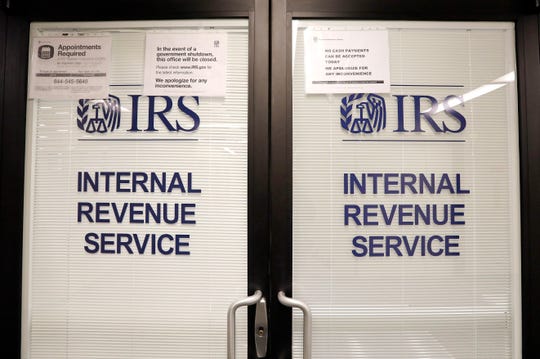Taxpayers couldn't get frozen refunds, present hardship cases while facing fines, or resolve audits of past tax returns. Only a handful of calls from taxpayers were answered during the 35-day lapse in funding, and the rate didn't substantially improve during the first week of the filing season when the government reopened.
The shutdown aside, the agency was still dealing with a backlog of unfinished items from the previous tax-filing season and was behind on integrating the new tax law changes.
"The five weeks could have not have come at a worse time for the IRS – facing its first filing season implementing a massive new tax law, with a completely restructured form," Olson wrote.
The Taxpayer Advocate Service (TAS) is a government office that helps taxpayers solve their problems with the IRS.
Smaller refunds: What will your tax refund be? So far, they're smaller by an average of $170
Tax tips: Taxes 2019: 10 common filing mistakes to avoid this year
How to get refund fast: Your tax refund won't be delayed if you do these two things

Doors at the Internal Revenue Service in the Henry M. Jackson Federal Building are locked and covered with blinds as a sign posted advises that the office will be closed during the partial government shutdown Wednesday, Jan. 16, 2019, in Seattle. (Photo: Elaine Thompson, AP)
The report itself – typically delivered to Congress in December – was also delayed because of the shutdown. In a statement, the IRS said its leadership plans to review the details of this report.
Shutdown backlogDuring the first part of the shutdown, no IRS employees could answer telephone lines, issue refunds, release liens and levies, create installment agreements or review pending IRS actions. Under a new IRS plan on Jan. 22, some IRS employees could answer phone lines, issue refunds and create installment agreements.
Missed paycheck? Federal workers still hurting from last lapse, survey finds
By the time the shutdown ended, the IRS faced the following:
More than 5 million pieces of mail that hadn't been batched for processing.80,000 unaddressed responses to Earned Income Tax Credit (EITC) audits from the previous tax season, some of which included frozen tax refunds.87,000 amended returns that still needed to be processed.The agency also couldn't keep up with the 170,000 orders for forms W-2 and W-3 that employers are required to distribute to their workers by the end of January. The agency instead recommended that employers consider filing an extension, meaning that some taxpayers could get these forms late.
Tax tips: Tax refund advance loans are often too good to be true. Here's what you should know
Telephone chaosIRS customer assistance over the phone was also disrupted and was not near full capacity one week after the shutdown ended, also the first week of the filing season.
Just under half of the calls to the accounts management line and 38 percent to the automated collection system were answered in that week. Only one out of every 15 calls to the installment agreement and balance due line were answered, and only after an almost 81-minute average wait time.
"This means for that week 93.3 percent of the taxpayers calling to make payment arrangements were unable to speak to a live assistor," the report said.
In a statement, the IRS noted that it had "successfully reopened operations" and is experiencing "a good start to the 2019 filing season."
"We are continuing to assess the impact of the shutdown on our various operations across the agency and remain proud of the many IRS employees who have risen to the resulting challenges," the statement said.
Hardship casesTaxpayers who desperately needed their frozen tax refunds or required relief from an IRS penalty had nowhere to turn during the shutdown, the report found. No IRS employee or TAS employee – which advocate for taxpayers – were authorized to work to assist a taxpayer experiencing a hardship because of the IRS.

(Photo: Getty Images)
The IRS chief counsel said that these functions didn't meet the requirements for the "safety of life" exception under the Anti-Deficiency Act.
"Neither of these exceptions would allow personnel to be excepted to issue a refund or release a levy in order to allow the taxpayer to obtain access to funds to receive a life-saving operation, for example," the report stated. "Nor could the IRS use resources to release a levy where it is depriving the taxpayer of funds to pay for basic living expenses, even if the levy could leave the taxpayer homeless."
Old technologyEven without the shutdown, the IRS was struggling. The report notes that the agency is using information technology systems that are the oldest in the federal government. "For the last 25 years the IRS has tried – and been unable – to replace them," the report said. Taxpayer information is stored in 60 different systems, making it impossible for the agency to have a "360-degree view of taxpayer data."
In its statement, the IRS said that modernizing its IT infrastructure remains a top priority for the agency and says it's "critical to the future of our nation's tax system."
"We will continue our efforts to upgrade this infrastructure, so that we have the technology needed to run day-to-day operations, enhance the taxpayer experience throughout the agency, monitor and continually improve cybersecurity and continue safeguarding taxpayer data," the agency statement said.
New tax law changesThe IRS was also under stress to roll out new tax law changes that required replacing three tax returns forms – the 1040, 1040A and 1040EZ – with one new form 1040, along with creating six new schedules for certain credits and deductions. The IRS had to publish new instructions, notices and FAQs to help the public navigate the new tax code.
Because of this work, the IRS did not provide the electronic filing requirements to tax software companies like TurboTax and H&R Block until September, much later than in previous years.
"As we document in these pages, the IRS is wrestling with its workload," the report states. "With the best of intentions – namely, trying to do its job – it is making strategic decisions that ultimately burden taxpayers (and) increase its own rework. And it is experiencing a 'cycle of frustration' as it tries to soldier on with its important work in the midst of shutdowns and funding stops and starts."
CLOSEWatch out for these 10 common tax mistakes Josmar Taveras, USA TODAY
No comments:
Post a Comment